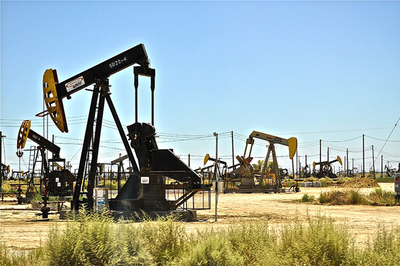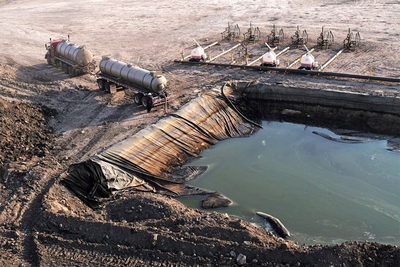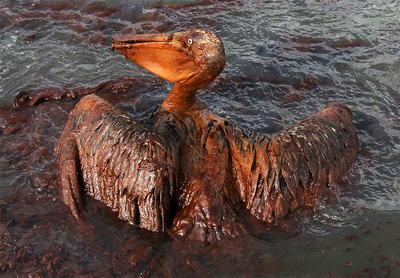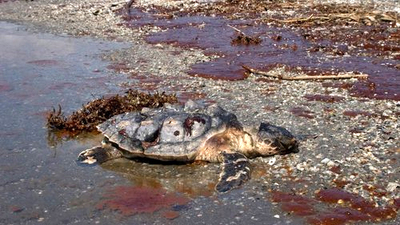Dismantling An Ethanol Crank - Professor André Boehman, University of Michigan UPDATED WITH REPLIES
 |
By Marc J. Rauch
Exec. Vice President/Co-Publisher
THE AUTO CHANNEL
 Marc J. Rauch |
Excuse this morose statement, but there is a point to it, and it is related to automobiles and fuels.
Internal combustion engines, regardless of whether they are built for automobiles, boats, lawn mowers, chain saws, or electric generators will all experience damage and death. It doesn't matter what you do to them, how you feed them, how much care you give them, or what they were used for: There is no guaranteed escape of their ultimate demise. This isn't to say that the owner of an engine should be frivolous and irresponsible in the use and upkeep of the machine, but it is to say that from the moment it leaves the assembly line and has its first use, it's on the road to the great pic-n-pull junkyard.
The reason I bring this up is that some people (those who are disposed for one reason or another to dislike ethanol fuel*) take the position that ethanol is deadly to internal combustion engines. They
talk and write as if an internal combustion engine will live forever as long as it's fed pure gasoline or petroleum diesel fuel - of course there's no such thing as pure gasoline, but that's another matter.
(*Ignorance or oil industry tutelage, or both.)
These people don't know, forgot, or just downright refuse to accept that fuels made from crude oil are poisonous to internal combustion engines - almost as poisonous to engines as they are to humans and other living creatures. Over the past decade or so, I've received some surprising backlash when I write that gasoline and diesel fuel are corrosive. Some don't want to believe that such magnificent elixirs (Hah!) could be the cause of an engine's destruction. They don't believe that anti-corrosion additives had to be added to gasoline, for example, to protect the engine; and they have often told me I was lying.
The fact of the matter is that ethanol is to an internal combustion engine what Geritol or Serutan are for humans (younger readers of this editorial may wish to google these names). Ethanol invigorates engines and causes them to be "regular" by helping to remove carbon deposits caused by the inefficient burning of gasoline and diesel fuel. It has been shown again and again that the simple addition of ethanol into a gasoline engine's fuel system can increase a vehicle's horsepower, without making any modifications to the engine. Ethanol also keeps fuel systems from freezing in extreme cold conditions, and it removes water that can accumulate in a fuel tank because of condensation.
On many occasions, I've taken on a number of "professional" people who use their academic or celebrity credentials to attack ethanol. Some of them truly think they know what they're talking about - it's rather mind-boggling how little they really know. I just came across another individual who can fit this description. His name is André Boehman, and he's Professor of Mechanical Engineering; Director, W.E. Lay Automotive Laboratory, University of Michigan. He also serves on the Technical Advisory Board for Oberon Fuels of San Diego, CA. Oberon is hoping to produce dimethyl ether (DME) fuel, a methane-like biofuel as a replacement for petroleum diesel fuel. It could be considered a competitor to ethanol (and this relationship might just be the underlying reason for Professor Boehman to write an article vilifying ethanol - I'll get back to this point later).
This past November, André Boehman wrote "The Government Aims To Boost Ethanol Without Evidence That It Saves Money Or Helps The Environment." It was published on a website called "TheConversation.com." As the title indicates, the article is in opposition to the use of ethanol fuel. It makes arguments based on claims that ethanol is bad for the environment and that it damages engines.
One of the things that I find most disconcerting about André's article is that it reads very similar to the information contained in a paper written and published in August 2016 by another University of Michigan professor - John M. DeCicco - with the assist of several research assistants/students from UofM. Boehman's article is so similar, in my opinion, that it may border on plagiarism. Perhaps Professor Boehman merely used Professor DeCicco's information as the foundation for his November 2018 statements, but in searching through the story I find no citation or credit given to DeCicco's 2016 work.
In any event, almost immediately after the publication of the paper produced by Professor DeCicco, et al, it was criticized and rebutted by other academic and government studies. In an August 2016 rebuttal that I wrote and published on TheAutoChannel.com, I included the following information:
"About a day after John DeCicco and the University of Michigan published their story, MichBio, the biosciences industry association in Michigan, issued a statement about DeCicco in which they wrote:
"It's unfortunate when scientists conduct research predicated on assumptions that lead to biased results, rather than conducting a truly independent analysis," said Stephen Rapundalo, PhD, President and CEO, MichBio. "Moreover, the Petroleum Institute’s direct funding of the research calls into question any impartiality on the part of the research team and hence the study’s conclusions.
"In sum, this study is an attempt by the oil industry to smear the biofuels industry and stifle competition in the fuels market. It ignores the benefits of Michigan's homegrown biofuels industry, and if its conclusions were to be valid stands to hinder a potential economic driver for Michigan and the U.S.
"Moreover, Argonne National Laboratory has stated that ethanol reduces greenhouse gas (GHG) emissions by an average of 34 percent compared to gasoline, even when the highly controversial and disputed theory on Indirect Land Use Change (ILUC) is factored into the modeling. Additionally, Argonne has found that without ILUC included, ethanol reduces GHG emissions by 57 percent compared to gasoline."
Since I read nothing in the Boehman story that represents any new information other than that contained in the DeCicco story, I would say that the rebuke above to DeCicco is also a rebuke of Boehman, even though it was made more than 2 years before André Boehman wrote his story.
More recently, in 2018, two new studies were released that contradict the claims that ethanol hurts the environment. I described these studies in an editorial I wrote and published in April 2018:
"The separate studies were conducted by the North Carolina State University (NCSU) and the University of California Riverside (UCR). The Urban Air Initiative (UAI) commissioned both independent studies to evaluate tailpipe emissions using fuels similar to what consumers can buy at the gas station, instead of laboratory created test fuels.
"The report issued by Urban Air Initiative, sponsors of the studies, states that today, 97% of gasoline in the United States contains 10% ethanol (E10). The new data from these studies provide evidence that air quality can be significantly improved when you add more ethanol to gasoline, creating higher blends with between 15% (E15) and 30% (E30) ethanol.
"For example, the NCSU study compares a regular E10 gasoline bought in Raleigh, North Carolina to that same fuel with ethanol simply added, making it an E25. The E25 had a 30-40% reduction in ultrafine particulates (UFP's), one of the most toxic emissions recorded. The E25 also reduced carbon monoxide by 15-30% and carbon emissions by up to 5%. Another positive result was that E25 had no change in NOx emissions compared to E10 using both Flex Fuel and Non Flex Fuel vehicles.
"The NOx data was even better in the UCR study. It showed a 10-30% reduction in NOx. This is a key difference from EPA designed studies that show ethanol blends raise NOx, according to UAI Technical Director Steve Vander Griend.
"By simply adding ethanol to current gasoline, this testing demonstrated the benefits of ethanol as a cleaner, higher octane fuel. The fact that these studies used consumer fuels and real world driving conditions is the most accurate reflection of what happens on the road every single day. It's this kind of science that will help give consumers more access to a healthier fuel," said Vander Griend.
"While both studies focused on what comes out of the tailpipe, the UCR study went a step further to evaluate the impact emissions have on air quality after leaving the tailpipe. Researchers found ethanol blends reduce toxic emissions by up to 50%, this includes smog and ultra-fine particulates. It also found that aromatics like benzene and toluene added to gasoline to boost octane directly raise emissions, while ethanol added to fuel decreases emissions. This study compared E10, E30 and E85 fuels and found the best results with the higher ethanol blends.
"This testing is about as real world as we can get when it comes to fuel blending and it is clear ethanol can significantly improve public health. The studies further validates the importance of splash blending, or simply adding ethanol to gasoline for fuel testing," Vander Griend said.
"The NCSU study is one of the first to look at real world fuels and real world driving conditions when evaluating tailpipe emissions. Researchers used Portable Emission Measurement System (PEMS) equipment to validate the benefits of ethanol. The data from both of these studies was presented at different workshops last month. They will both be peer reviewed and published later this year."
Let me further address this entire ridiculously absurd issue of ethanol being as hazardous (or more hazardous) as petroleum oil fuels to the environment in the simplest manner possible, with the use of photographs and videos.
This is what oil fields look like:
This is what a U.S. ethanol corn field looks like:
This is what tar sands oil field looks like:
This is what an Australian ethanol wheat field looks like:
Here's what the burning of gasoline looks like compared to the burning of ethanol:
These photos are a result of what happens from oil spills and disasters:
 |
I don't have any photographs of animals dying due to ethanol spills. I searched online and couldn't find any... because there aren't any. (If you have some please send me a copy.)
Okay, anyone have any more questions as to which is the dirty, deadly, disastrous fuel and which one is the clean, environmentally conscious fuel?
There is, however, one thing I liked about Professor Boehman and his article: He responded to people leaving comments on the webpage that carried his story. This is something that almost all ethanol bashers avoid doing - they typically write their fallacious story, get it published, and then disappear. Professor Boehman went toe-to-to with some of the commenters. Unfortunately for him, it backfired. Here's what happened:
In the article, Professor Boehman makes the usual general statement (with no specifics) about ethanol potentially damaging vehicles manufactured prior to 2001. A commenter (Frank Eggers) challenges Boehman on this. In reply, Boehman refers to a U.S. Dept. of Energy study that purportedly provides information that E15 and E20 will cause a variety of problems. Boehman writes that this study concludes that E15-E20:
"...could include corrosion, deterioration of fuel system components such as hoses and seals, reaching a limit of the vehicle’s ability to adjust fuel air ratio which can cause a Malfunction Indicator Light (MIL) to appear on your dashboard, and increases in evaporative emissions."
If we were to take this warning as being an accurate reflection of this supposed DOE study that Boehman cites, it is at best an extremely mild caution that pretty much concludes with the possibility that the dashboard check-engine light will illuminate if you use too much ethanol in a blend.
Yet, in reviewing the link to the DOE study referenced by Boehman, the link doesn't take you to a single DOE study, it takes you to a bibliography of studies and papers. And if you take the time to go through the studies and papers that reference E15 and E20 (and other mid-level ethanol-gasoline blends), you come away with information that basically contradicts all of the negatives that Boehman offers about ethanol. In other words, as far as I can tell, Boehman's reply to Eggers included the link in an effort into making Eggers believe that there was information that confirms the disparaging remarks.
This isn't to say that any of the individual reports in the collection of reports make the claim that ethanol will allow an engine to last forever, which, as I stated at the very beginning of this page, is impossible. At worst, the individual reports indicate that an internal combustion engine running on an ethanol-gasoline blend will experience some or all of the same long-term effects that are caused by petroleum oil fuels, namely: Wear and Tear.
However, here's the thing that really gets me: Professor Boehman says that he has spent the past 24 years in the study of alternative fuels and fuel blends. He further states: "Based on my research, and as a consumer, I can say that increasing the amount of ethanol blended with gasoline creates problems with older engines and potentially increases air pollution due to increased fuel evaporation while doing little to curb climate change." But he offers no proof of any of any personal research as a professor, a mechanical engineer, or as a consumer.
In fact, in making the claim that ethanol can and could cause corrosion and deterioration of fuel system components that is more excessive than the corrosion and deterioration that petroleum oil fuels causes, Boehman proves that he knows nothing about the subject matter. Comparative databases and charts, such as those provided at https://www.customadvanced.com, http://www.graco.com, https://www.calpaclab.com, http://www.plasticsintl.com, and https://www.calpaclab.com, show that ethanol is compatible with more rubbers, plastics, and metals than gasoline and aromatics (benzene, toluene, and xylene). So, with this in mind, what fuel system components is he referring to?
In all the years that I've been responding to articles and papers written by professors, chemists, mechanical engineers, and media spokespeople who bash ethanol, not one has ever presented an actual example of how ethanol damaged their personal vehicles or power equipment...I can't think of one.
How is it that they haven't done the same personal testing as me?
How is it that not one has a personal case study that can specifically detail how ethanol has caused damage to one of their machines?
Have these people ever actually owned and driven a car?
In his article, Professor Boehman writes that he recently watched a TV commercial during a football game that touts two arguments in favor of increasing corn ethanol production. The first argument is that E15 will result in cleaner air, and the second is that it will be at a lower cost. Boehman says that these are flawed arguments. However, it is Boehman's arguments that are flawed.
As I've already shown, there is far more than ample proof that ethanol helps clean the air. Regarding the cost issue, Boehman goes on to write, "The problem is that blending ethanol with other fuels lowers their energy content, slightly decreasing fuel economy. It may cost a bit less to fill up your tank but based on my calculations the decrease in miles per gallon that E15 would yield will mean it makes no difference on your wallet."
In the first place, the "lower energy content" is irrelevant. An internal combustion engine optimized to run on gasoline doesn't get less mileage when fueled with ethanol-gasoline blends because the blend has a lower energy content, it gets lower miles per gallon because the engine is optimized to run on the characteristics of gasoline. If the blend consisted of diesel fuel and gasoline, it would have a greater energy content, but you wouldn't get more miles per gallon - you'd get less, or none at all because your gasoline engine might not run on a diesel-gasoline blend. Professor Boehman is a professor of mechanical engineering, why does he need me to explain this to him?
In the second place, the fewer miles per gallon that your gasoline-optimized engine might get from using an ethanol-gasoline blend is almost always offset by a higher percentage of savings per gallon of fuel. Therefore, if by using E15 you get 12% fewer miles per gallon, but you save 20% compared to the price of ethanol-free gasoline, then there is a 8% net gain. This does make a difference to your wallet. If the cost saving merely makes up for the lower MPG, then there's still no reason to complain about any lower mileage. And, if E15 or E20 is not providing sufficient cost incentive vis-a-vis a cost/mileage comparison, then that's all the more reason for a consumer to step up to using an E30 blend - after all, tests have shown that E30 can provide equal or better MPG compared to E0 in both non-flex fuel and flex fuel vehicles - how's that for proving the irrelevance of lower energy content!!!
The bottom line is that Professor Boehman's article defiling ethanol is an absolute waste of time; he is incorrect. He should be embarrassed for writing this, and his school should be embarrassed that he associated them with the article. If the purpose of the article was to help Oberon Fuels create a market for their DME biofuel as an alternative to petroleum diesel fuel, then they should be embarrassed, as well. If Oberon has a product that can safely, cheaply, and healthfully replace petrol-diesel, then they should get to producing and marketing it. Stop talking about it, and do it. But to use the same idiotic myths and erroneous information that the oil industry uses to attack ethanol is a great mistake. If and when the oil industry perceives Oberon as a serious threat they will use the information against Oberon.
The above editorial was posted on TheAutoChannel.com at 2:40AM EDT on March 12, 2019
REPLY FROM ANDRÉ BOEHMAN at 8:45AM on March 12, 2019:
Dear Marc:
I don't want to get into an argument with you about ethanol, because in fact, I think that ethanol can be a great fuel. What we need is engines that are optimized for operation on ethanol, to fully utilize its unique and highly beneficial properties, such as its high RON and its high latent heat of vaporization. One cannot argue that the E15 waiver, about which my article in The Conversation was written, is a bad idea for air quality. This would increase RVP of those higher ethanol fuel blends, and lead to greater evaporative emissions. I have heard at multiple technical meetings that an ideal ethanol fuel blend may be higher than E20, maybe E30, in the longer term. That could hit a sweet spot of fuel properties that would maximize the benefits of ethanol, while mitigating some of its challenges. But we also need more sustainable routes to produce ethanol, with greater life cycle carbon efficiency.
My love for DME goes back to my first experiences with it. It can replace diesel fuels, and lead to smokeless diesel combustion. But DME has its own challenges, such as low lubricity and severe elastomer compatability challenges. An interesting note, is that DME and ethanol are isomers (same chemical formula, different chemical structure). Same chemical formula, but ethanol has a RON over 100 and DME has a cetane number over 55. They couldn't be more different in their autoignition behavior, but are comprised of the same atoms.
As an FYI, I had two vehicles that demonstrated significant ethanol incompatibilities, a Volkswagen and an Audi. This is something that many Volkswagen owners have observed. It involves vapor lock in the fuel delivery system leading to rough engine operation. I saw this with a 1987 Volkswagen Cabriolet, and a 1997 Audi A4. It happened on hot days during relatively low speed operation, when heat can build up under the hood of the car. This apparently causes fuel in the supply lines near the engine to boil. It occurred in my 1987 VW while traveling in Idaho and fueling on "gasohol" in 1992. It was so severe, the car started bucking like riding a bull. In my Audi, it was less severe, but I periodically also had to clear an error code in the ECU on hot summer days when I would idle or drive slowly with E10 fuel in my car. The error reported was related to "lean trim" as the engine tried to adjust for the reduced air requirement for burning E10. This is a real issue for older vehicles that were not designed for E10 fuels. But it is a non-issue for all vehicles since 2006 (and probably since 2001).
By the way, we recently reported some interesting results by combining port fuel injection and direct injection of fuels, comparing burning an E20 blend direct injected, with splitting the gasoline and ethanol as two separately injected fuels. The interest here is in enhancing knock resistance through judicious use of ethanol, and manipulating where the ethanol resides in the combustion chamber to achieve a maximum knock resistance effect. See our recent SAE paper on injection.
Regards,
Andre
RESPONSE FROM MARC RAUCH at 12:45PM on March 12, 2019
Hi Andre -
Thank you for taking the time to read my comments and for your reply. I'm very happy to hear your positive thoughts about ethanol (but I wish you'd have made that clear in your article), and that you are aware of reports about higher blends (i.e., E30) being more ideally suited to our current national fleet of gasoline ICE vehicles. I particularly thank you for including some information about your personal experiences. As I mentioned in my original remarks, in the many, many instances in which I have read and responded to other people who published negative stories about ethanol, none of them have provide any actual examples of their personal experience using ethanol.
I agree that it would be great to have engines that are optimized to run on ethanol. A paper I wrote and published in summer 2008 called for the banning of all new gasoline optimized internal combustion engines by 2014, in favor of ethanol-optimized engines, CNG and/or propane engines, and/or other engines optimized to run on other fuels such as methanol/methane, etc. Needless to say, nothing like this happened in 2014, 15, etc.
Today, I don't favor a five-year plan, I favor an immediate mandate that all "gasoline" be at least an E30 blend, and that all new engines henceforth be optimized to run on E85 and higher. My own personal experience with a long-term test of a non-flex fuel car, as well as more current tests with a flex fuel van, indicate that blends up around E40 provide the best general results ("best" measured by MPG). I have written about these experiences on a number of occasions, and have published reports that include one especially memorable smog test with my non-flex fuel 2002 Ford Taurus (the results were so good that the technician had to perform the test twice because he thought his machine was malfunctioning).
Your experience with vapor lock is interesting. The issue of vapor lock first came to my attention in the early 1970's, when I lived in South Florida. I experienced it with my first new car (a 1974 Pontiac Grand Prix). I had friends and neighbors who also experienced it with their vehicles. Of course, this was way before any widespread use of ethanol-gasoline blends in America. I often comment that the problems blamed on ethanol today are nothing more than the same old problems that existed in all the years before the adoption of the Renewable Fuel Standard. I guess this is more proof of that.
In addition, we have to consider all the years that ethanol-gasoline blends were available in England and the rest of Europe (1920's through 1970's). I've written about this use on several occasions, and published one longer story about it in December 2017 (you can find it by CLICKING HERE). If there were any reports back then of vapor lock problems due to the ethanol-gasoline blends, I have never come across any. Similarly, I am unaware of any great flood of vapor lock problem reports from Brazil during their many years of E10-E15 use before their adoption of E25 and E27.
Regarding the goal being "more sustainable routes to produce ethanol, with greater life cycle carbon efficiency," I agree, and I would say that everyone that I know in any part of the ethanol world would agree with you. They believe that they are working towards those goals, and I would agree that they are. We all know that corn is not the absolute best raw material to use to make ethanol in text book terms, but taking into account real world factors and current technology, it is the best for America (and maybe some other countries) right now. The problem with projecting ahead to materials and processes that could be better is that we will never get there if we have to keep fending off exhausting, fallacious attacks from the oil industry and other would-be contenders. In my opinion, the best way to get to the "promised land" of cellulosic ethanol and 30,000 gallon-per-acre ethanol yields from salt water algae is to have a marketplace that is ready to use all that ethanol. If we keep diddling around with gasoline and petro-diesel (and being diverted by un-realistic electric dreams), waiting for the perfect moment, the perfect moment will never come - It'll be the year 2090 and people will still be dependent on despotic petroleum oil producers, subject to their willy-nilly price fluctuations, and fighting diseases caused by oil-based pollution.
If Oberon's DME fuel can help rid us of petro-diesel fuel and kick the heck out of the oil industry, I'm all for it. But as I said previously, the villain to target is petroleum oil fuels, not corn ethanol. The success of corn ethanol paves the way to a clean, healthy future; ride on it's coattails, but don't get in its way.
I am aware of the testing being done with combo direct and port injection. If it helps, great.
Thanks again for your response. I look forward to hearing from you again.
Regards.
Marc








